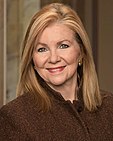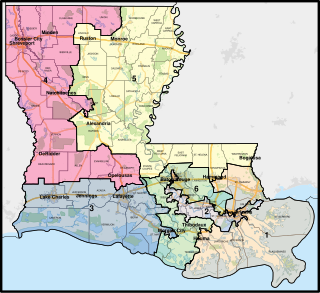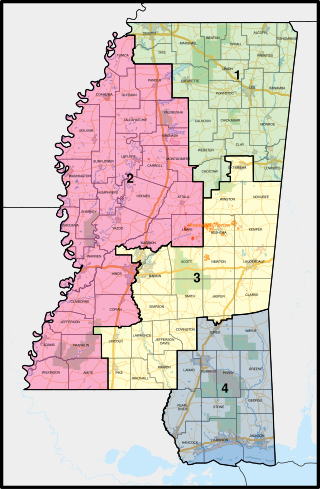U.S. House of Representatives

Current members
List of current members United States House from Tennessee, their terms in office, district boundaries, and the district political ratings according to the CPVI. The delegation has 9 members: 8 Republicans and 1 Democrat.
| District | Member (residence) | Party | Incumbency | CPVI | District map |
|---|---|---|---|---|---|
| 1st |  Diana Harshbarger (Kingsport) | Republican | since January 3, 2021 | R+30 |  |
| 2nd | 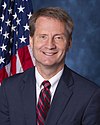 Tim Burchett (Knoxville) | Republican | since January 3, 2019 | R+18 |  |
| 3rd |  Chuck Fleischmann (Ooltewah) | Republican | since January 3, 2011 | R+19 |  |
| 4th |  Scott DesJarlais (Sherwood) | Republican | since January 3, 2011 | R+22 |  |
| 5th |  Andy Ogles (Columbia) | Republican | since January 3, 2023 | R+9 |  |
| 6th |  John Rose (Cookeville) | Republican | since January 3, 2019 | R+17 |  |
| 7th |  Mark Green (Clarksville) | Republican | since January 3, 2019 | R+10 |  |
| 8th |  David Kustoff (Germantown) | Republican | since January 3, 2017 | R+21 |  |
| 9th |  Steve Cohen (Memphis) | Democratic | since January 3, 2007 | D+22 | 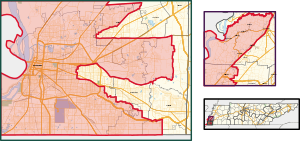 |
1789–1791: part of North Carolina
John Sevier was elected in North Carolina's 5th district , which included the territory of the former State of Franklin. He continued to serve after the entirety of his district was ceded to the federal government and formed the Southwest Territory.
1793–1796: 1 non-voting delegate
| Congress | Delegate |
|---|---|
| 3rd (1793–1795) | James White |
| 4th (1795–1796) |
1796–1803: 1 seat
From achieving statehood on December 4, 1796, until 1803, Tennessee elected one representative, at-large, statewide.
| Congress | At-large |
|---|---|
| 4th (1796–1797) | Andrew Jackson (DR) |
| William C. C. Claiborne (DR) | |
| 5th (1797–1799) | |
| 6th (1799–1801) | |
| 7th (1801–1803) | William Dickson (DR) |
1803–1813: 3 seats
Tennessee elected three representatives, at-large, statewide for the 8th Congress, and then in separate districts after that.
| Congress | 1st at-large seat | 2nd at-large seat | 3rd at-large seat |
|---|---|---|---|
| 8th (1803–1805) | William Dickson (DR) | George W. Campbell (DR) | John Rhea (DR) |
| Congress | 1st district | 2nd district | 3rd district |
| 9th (1805–1807) | John Rhea (DR) | George W. Campbell (DR) | William Dickson (DR) |
| 10th (1807–1809) | Jesse Wharton (DR) | ||
| 11th (1809–1811) | Robert Weakley (DR) | Pleasant Moorman Miller (DR) | |
| 12th (1811–1813) | John Sevier (DR) | Felix Grundy (DR) |
1813–1823: 6 seats
Tennessee elected six representatives from districts.
| Congress | 1st district | 2nd district | 3rd district | 4th district | 5th district | 6th district |
|---|---|---|---|---|---|---|
| 13th (1813–1815) | John Rhea (DR) | John Sevier (DR) | Thomas K. Harris (DR) | John Henry Bowen (DR) | Felix Grundy (DR) | Parry Wayne Humphries (DR) |
| Newton Cannon (DR) | ||||||
| 14th (1815–1817) | Samuel Powell (DR) | Isaac Thomas (DR) | Bennett H. Henderson (DR) | James B. Reynolds (DR) | ||
| William Grainger Blount (DR) | ||||||
| 15th (1817–1819) | John Rhea (DR) | Francis Jones (DR) | Samuel E. Hogg (DR) | Thomas Claiborne (DR) | George Washington Lent Marr (DR) | |
| 16th (1819–1821) | John Alexander Cocke (DR) | Robert Allen (DR) | Newton Cannon (DR) | Henry Hunter Bryan (DR) | ||
| 17th (1821–1823) | vacant |
1823–1833: 9 seats
From 1823 to 1833, Tennessee elected nine representatives.
| Congress | District | ||||||||||||
|---|---|---|---|---|---|---|---|---|---|---|---|---|---|
| 1st | 2nd | 3rd | 4th | 5th | 6th | 7th | 8th | 9th | |||||
| 18th (1823–1825) | John Blair (DR) [lower-alpha 1] | John Cocke (DR) [lower-alpha 1] | James Israel Standifer (DR) [lower-alpha 1] | Jacob C. Isacks (DR) [lower-alpha 1] | Robert Allen (DR) [lower-alpha 1] | James T. Standford (DR) [lower-alpha 1] | Sam Houston (DR) [lower-alpha 1] | James B. Reynolds (DR) [lower-alpha 1] | Adam Rankin Alexander (DR) [lower-alpha 1] | ||||
| 19th (1825–1827) | John Blair (J) | John Cocke (J) | James Coffield Mitchell (J) | Jacob C. Isacks (J) | Robert Allen (J) | James K. Polk (J) | Sam Houston (J) | John Hartwell Marable (J) | Adam Rankin Alexander (J) | ||||
| 20th (1827–1829) | Pryor Lea (D) | Robert Desha (D) | John Bell (D) | Davy Crockett (NR) | |||||||||
| 21st (1829–1831) | James Israel Standifer (J) | Cave Johnson (J) | |||||||||||
| 22nd (1831–1833) | Thomas Dickens Arnold (NR) | William Hall (J) | William Fitzgerald (J) | ||||||||||
1833–1843: 13 seats
For the ten years following the 1830 census, Tennessee had its largest apportionment of 13 seats.
1843–1853: 11 seats
After the 1840 census, Tennessee lost 2 seats.
| Congress | District | ||||||||||
|---|---|---|---|---|---|---|---|---|---|---|---|
| 1st | 2nd | 3rd | 4th | 5th | 6th | 7th | 8th | 9th | 10th | 11th | |
| 28th (1843–1845) | Andrew Johnson (D) | William Tandy Senter (W) | Julius W. Blackwell (D) | Alvan Cullom (D) | George W. Jones (D) | Aaron V. Brown (D) | David W. Dickinson (W) | Joseph Hopkins Peyton (W) | Cave Johnson (D) | John Baptista Ashe (W) | Milton Brown (W) |
| 29th (1845–1847) | William Michael Cocke (W) | John Hervey Crozier (W) | Barclay Martin (D) | Meredith Pointdexter Gentry (W) | Lucien Bonaparte Chase (D) | Frederick P. Stanton (D) | |||||
| Edwin Hickman Ewing (W) | |||||||||||
| 30th (1847–1849) | Hugh Lawson White Hill (D) | James Houston Thomas (D) | Washington Barrow (W) | William T. Haskell (W) | |||||||
| 31st (1849–1851) | Albert Galiton Watkins (W) | Josiah M. Anderson (W) | John H. Savage (D) | Andrew Ewing (D) | Isham G. Harris (D) | Christopher Harris Williams (W) | |||||
| 32nd (1851–1853) | William M. Churchwell (D) | William Hawkins Polk (ID) | William Cullom (W) | ||||||||
1853–1863: 10 seats
After the 1850 census, Tennessee lost 1 seat.
| Congress | District | |||||||||
|---|---|---|---|---|---|---|---|---|---|---|
| 1st | 2nd | 3rd | 4th | 5th | 6th | 7th | 8th | 9th | 10th | |
| 33rd (1853–1855) | Brookins Campbell (D) | William M. Churchwell (D) | Samuel Axley Smith (D) | William Cullom (W) | Charles Ready (W) | George W. Jones (D) | Robert M. Bugg (W) | Felix Zellicoffer (W) | Emerson Etheridge (W) | Frederick P. Stanton (D) |
| Nathaniel Taylor (W) | ||||||||||
| 34th (1855–1857) | Albert Gailton Watkins (D) | William Henry Sneed (KN) | John H. Savage (D) | Charles Ready (KN) | John Vines Wright (D) | Felix Zelicoffer (KN) | Emerson Etheridge (KN) | Thomas Rivers (KN) | ||
| 35th (1857–1859) | Horace Maynard (KN) | John D. C. Atkins (D) | William T. Avery (D) | |||||||
| 36th (1859–1861) | Thomas A. R. Nelson (O) | Horace Maynard (O) | Reese Bowen Brabson (O) | William B. Stokes (O) | Robert H. Hatton (O) | James Houston Thomas (D) | James Minor Quarles (O) | Emerson Etheridge (O) | ||
| 37th (1861–1863) | Nelson re-elected but failed to take office | Horace Maynard (U) | George Washington Bridges (U) | A. J. Clements (U) | American Civil War | |||||
1863–1873: 8 seats
After the 1860 census, Tennessee lost 2 seats.
| Congress | District | |||||||
|---|---|---|---|---|---|---|---|---|
| 1st | 2nd | 3rd | 4th | 5th | 6th | 7th | 8th | |
| 38th (1863–1865) | American Civil War | |||||||
| 39th (1865–1867) | Nathaniel Green Taylor (U) | Horace Maynard (UU) | William B. Stokes (U) | Edmund Cooper (U) | William B. Campbell (U) | Samuel Mayes Arnell (UU) | Isaac Roberts Hawkins (U) | John W. Leftwich (U) |
| 40th (1867–1869) | Roderick R. Butler (R) | Horace Maynard (R) | William B. Stokes (R) | James Mullins (R) | John Trimble (R) | Samuel Mayes Arnell (R) | Isaac Roberts Hawkins (R) | David A. Nunn (R) |
| 41st (1869–1871) | Lewis Tillman (R) | William F. Prosser (R) | William J. Smith (R) | |||||
| 42nd (1871–1873) | Abraham Ellison Garrett (D) | John M. Bright (D) | Edward Isaac Golladay (D) | Washington C. Whitthorne (D) | Robert Porter Caldwell (D) | William Wirt Vaughan (D) | ||
1873–1933: 10 seats
After the 1870 census, Tennessee gained 2 seats.
- 1 2 In the 43rd Congress, Horace Maynard was elected to the state's at-large seat .
1933–1943: 9 seats
After the 1930 census, Tennessee lost 1 seat.
| Congress | District | ||||||||
|---|---|---|---|---|---|---|---|---|---|
| 1st | 2nd | 3rd | 4th | 5th | 6th | 7th | 8th | 9th | |
| 73rd (1933–1935) | B. Carroll Reece (R) | J. Will Taylor (R) | Samuel Davis McReynolds (D) | John Ridley Mitchell (D) | Jo Byrns (D) | Clarence W. Turner (D) | Gordon Browning (D) | Jere Cooper (D) | E. H. Crump (D) |
| 74th (1935–1937) | Herron C. Pearson (D) | Walter Chandler (D) | |||||||
| 75th (1937–1939) | Richard Merrill Atkinson (D) | ||||||||
| 76th (1939–1941) | Albert Gore Sr. (D) | Joseph W. Byrns Jr. (D) | |||||||
| John Jennings (R) | Estes Kefauver (D) | W. Wirt Courtney (D) | Clifford Davis (D) | ||||||
| 77th (1941–1943) | Percy Priest (D) | ||||||||
1943–1953: 10 seats
After the 1940 census, Tennessee gained 1 seat.
| Congress | District | |||||||||
|---|---|---|---|---|---|---|---|---|---|---|
| 1st | 2nd | 3rd | 4th | 5th | 6th | 7th | 8th | 9th | 10th | |
| 78th (1943–1945) | B. Carroll Reece (R) | John Jennings (R) | Estes Kefauver (D) | Albert Gore Sr. (D) | Jim N. McCord (D) | Percy Priest (D) | W. Wirt Courtney (D) | Tom J. Murray (D) | Jere Cooper (D) | Clifford Davis (D) |
| 79th (1945–1947) | Harold Earthman (D) | |||||||||
| 80th (1947–1949) | Dayton E. Phillips (R) | Joe L. Evins (D) | ||||||||
| 81st (1949–1951) | James B. Frazier Jr. (D) | James P. Sutton (D) | ||||||||
| 82nd (1951–1953) | B. Carroll Reece (R) | Howard Baker Sr. (R) | ||||||||
1953–1973: 9 seats
After the 1950 census, Tennessee lost 1 seat.
| Congress | District | ||||||||
|---|---|---|---|---|---|---|---|---|---|
| 1st | 2nd | 3rd | 4th | 5th | 6th | 7th | 8th | 9th | |
| 83rd (1953–1955) | B. Carroll Reece (R) | Howard Baker Sr. (R) | James B. Frazier Jr. (D) | Joe L. Evins (D) | Percy Priest (D) | James P. Sutton (D) | Tom J. Murray (D) | Jere Cooper (D) | Clifford Davis (D) |
| 84th (1955–1957) | Ross Bass (D) | ||||||||
| 85th (1957–1959) | J. Carlton Loser (D) | ||||||||
| Fats Everett (D) | |||||||||
| 86th (1959–1961) | |||||||||
| 87th (1961–1963) | |||||||||
| Louise G. Reece (R) | |||||||||
| 88th (1963–1965) | Jimmy Quillen (R) | Bill Brock (R) | Richard Fulton (D) | ||||||
| Irene Baker (R) | |||||||||
| 89th (1965–1967) | John Duncan Sr. (R) | William Anderson (D) | George W. Grider (D) | ||||||
| 90th (1967–1969) | Ray Blanton (D) | Dan Kuykendall (R) | |||||||
| 91st (1969–1971) | |||||||||
| Ed Jones (D) | |||||||||
| 92nd (1971–1973) | LaMar Baker (R) | ||||||||
1973–1983: 8 seats
After the 1970 census, Tennessee lost 1 seat.
| Congress | District | |||||||
|---|---|---|---|---|---|---|---|---|
| 1st | 2nd | 3rd | 4th | 5th | 6th | 7th | 8th | |
| 93rd (1973–1975) | Jimmy Quillen (R) | John Duncan Sr. (R) | LaMar Baker (R) | Joe L. Evins (D) | Richard Fulton (D) | Robin Beard (R) | Ed Jones (D) | Dan Kuykendall (R) |
| 94th (1975–1977) | Marilyn Lloyd (D) | Harold Ford Sr. (D) | ||||||
| Clifford Allen (D) | ||||||||
| 95th (1977–1979) | Al Gore (D) | |||||||
| 96th (1979–1981) | Bill Boner (D) | |||||||
| 97th (1981–1983) | ||||||||
1983–present: 9 seats
After the 1980 census, Tennessee gained 1 seat.
